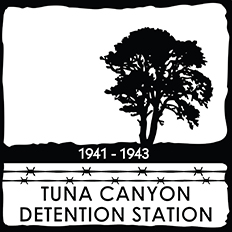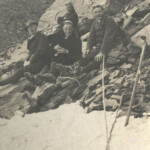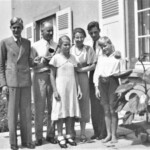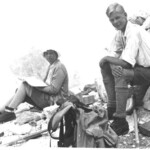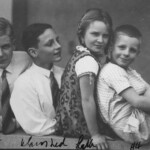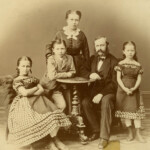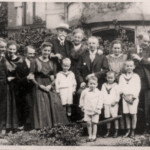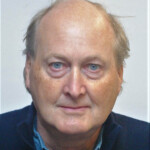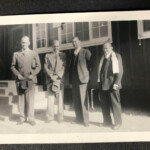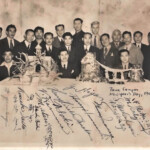As far back as I can remember my father Fritz had an aversion to anything to do with curry. I knew this had something to do with his having been interned in California during the Second World War but little beyond this. In fact, until he was interviewed very late in his long lifetime, he had not talked much about this experience except to relate some stories about his fellow internees and of course to express his distaste with a grimace when curry was even mentioned.
My interest in the subject was more strongly aroused when I was clearing a basement in my parents’ house in Portugal. It contained a rusty green filing cabinet which had clearly not been opened for several decades. At first sight this appeared to contain only file after file of ancient bank statements and cheque stubs going back to the mid-1940s. The damp in the basement meant that all the files were covered in a decidedly unappealing and probably toxic powdery yellow mould and after a brief glimpse I decided that establishing what my parents’ expenditures were in 1945 was decidedly uninteresting. The files clearly needed to be jettisoned as rapidly as possible. In this process, however, one damp manila folder packed with papers jumped out of the pile. It was marked in ink in my father’s distinctive handwriting from a period when it was still more immediately legible and referred to ‘correspondence about possible and actual detentions’. He had put all the papers, letters, notes and newspaper clippings in a file in late 1945. Somehow, they had sat in this filing cabinet presumably moving from basement to basement, continent to continent country to country and house to house ever since. This suggested to me while he could never get rid of anything this particular file was clearly something he wanted to forget about. Understandably so, as by 1945 the war was over and in many ways he had started on a new life.
The documents I discovered in the folder filled in the picture I already had some idea of when my sister Andrea had recovered my father’s one hundred- and twenty-page FBI file from the US National Archives under a Freedom of Information request in about 2002. At that time the main thing we had asked my father about was an obscure reference to his being tailed by an FBI agent on a walk in the mountains north of Los Angeles with what the FBI agent termed a ‘woman’. This so-called ‘woman’ was called Elita Walker and was later to become my mother. My father recalled their walk had taken them up to a lake where, as the agent tracking them reported, they had apparently sat down at around noon.
A distant lookout had noted that Fritz or some other person had then commenced to send undecipherable Morse code messages using a mirror. Clearly passing on the information about the high-power transmission lines taking electricity down to Los Angeles to another enemy agent.
We puzzled with my father as to what this might have related to. He was not a musical man but, in the end, the ‘culprit’ turned out to be a musical instrument. A rectangular Hohner mouth organ or harmonica with reflecting engraved chrome cover plates on each side. He was playing a melody for his girlfriend, but this was eventually to be part of the ‘evidence’ against him.

Extract from FBI file relating to FC
Finding out more about all this rather obscure part of my father’s and US history was the continuation of a journey I had been on for a while. For me personally, paradoxically perhaps after he died, it was also a way of getting to know my father better and to understand what this particularly difficult period in his life had meant for him, for my mother, and ultimately for us his children.
Following the discovery of the mouldy file some six years ago, during a Google search my sister Andrea found a link to the website of the Tuna Canyon Detention Station Coalition (TCDSC) and I decided to get in touch with them to share the information I had uncovered about the camp. Some time later Professor Russell Endo of the TCDSC was able to spend some months in the National Archives in Washington DC and extract further background on my father’s case history as well as providing a broader historical context about the incarcerations which took place at this time.
But back to Fritz. I knew and had always somehow been relieved by the fact that my father had been an unusual German in that he had lived through the period when most of his country had been in thrall to the Nazis when he was not. He had in fact been vehemently opposed to the regime and I had long wanted to understand better why this had been so, what it had been like to live under such a totalitarian system and how he had escaped the fate of many of his friends and family who had died fighting in the military or as a consequence of opposing the regime.
Fritz was born in 1914 and grew up in Heidelberg in southern Germany. His father was a mechanical engineer who worked for a large Swiss engineering company. His family environment was patriotic but not nationalist and his parents and especially his mother were strongly influenced by pacifist thinking and encouraged Fritz and his younger siblings to gain experience of other countries and cultures. They did this by facilitating exchanges with young people of his own age in France and Norway and by organising a visit to England in 1932 to learn English.
The period of the Weimar Republic which was installed in Germany after the end of the First World War and lasted until Hitler seized power in 1933 was a turbulent time economically and politically and Fritz became fascinated by politics from an early age. One of his early memories was of being taken to a tributary of the Rhine and seeing the decidedly dejected looking troops marching back home after the defeat and end of the war. He apparently also became an avid reader of newspapers and by the time he was an early teenager he was a passionate supporter of Weimar’s fragile democracy. By his late teens in the early 1930s he had also rather unusually read Hitler’s book ‘MeinKampf’ outlining his expansionist, profoundly authoritarian and racist plans for Germany which so horrified him that he became permanently opposed to all he stood for.
This background and outlook and Fritz’s strong language skills I believe ultimately helped him to gain a Rhodes Scholarship in 1932 enabling him to study in Oxford for three years from 1933 to 1936. This in turn allowed him to travel at a time it was difficult to obtain a passport with the suitable permissions. Following on from this he was then also able to find a first job teaching as an assistant Professor at Southwestern University in Memphis, Tennessee in the United States after he finished his studies. He stayed there for one academic year before returning to Germany to write his PhD dissertation and complete his military service, then going back to the US early in 1939 to take up a position as an assistant Professor and Tutor in History and German Language and Civilisation at the all-female Scripps College in Claremont in southern California.
In the summer of 1939, he travelled back to Germany again with the express intention of seeing whether he could persuade his sister to join him in the US but was unsuccessful in this venture and so returned to the US in September 1939 to carry on teaching at Scripps. He spent the next two years teaching at Scripps and living in Claremont with the small family of another more senior colleague at the college, Professor Arnold Bergstraesser a fellow German emigrant who was to share the internment experience with Fritz.
While the debate about whether the US should stay neutral or enter the war had raged in the US over these years Fritz had been under no illusion in this regard. He felt certain that sooner or later the US would enter the war on the Allied side. He knew he did not wish to fight for Hitler as his two brothers and many of his close friends were doing. At the same time, he did not want to become a US citizen and fight against Germany. Instead, he hoped that one day, he would be able to return and help re-build a better Germany.
As Pearl Harbour approached and the US increasingly shifted towards entry into the war, Fritz had become increasingly concerned about the risks of detention should war break out and with the help of the Rhodes Trust in the US he (and two other German Rhodes scholars) he compiled a dossier with over twenty letters of support documenting the fact that he was not a supporter of the Nazis. This was submitted to the Department of Justice with the US Solicitor-General in August 1941.

Fritz Caspari photo for Scripps College yearbook ‘La Semeuse’ 1940, age 26
Unbeknownst to Fritz, however, starting in 1939, three U.S. government agencies, but mainly the FBI, had begun compiling lists of German, Japanese, and Italian “security” risks who could be arrested if war broke out. These lists had three main categories, A/B/C, with A supposedly being the most “dangerous.” Members of suspect organizations such as the German American Bund and Friends of New Germany which represented vocal US supporters of the Nazi regime and had encouraged the US to stay neutral in the ongoing war in Europe; Japanese, Italian, German community leaders, and specific occupations (such as Japanese language schoolteachers and Italian fishermen) were categorized as A/B/C, and were then put on custodial detention lists. Other individuals that came to the attention of the FBI, for example through informants, were also put on these lists. Most of the people on these lists were non-citizen immigrants like Fritz but some were also U.S. citizens. In 1940, the FBI was asked to turn its lists over to a so-called Special Defense Unit (SDU) and to have this organisation classify and monitor all suspect individuals, but the FBI also kept its own secret lists. Fritz was on one of these and as a result of this on October 28, 1941, FBI Director J. Edgar Hoover sent a dossier on Fritz to the SDU. The recommendation was that he be detained in the event of war.1
Fritz had been given the highest A-2 classification i.e. the most dangerous category2. This meant that when suddenly the strange peace which had lasted for the US since the outbreak of war in Europe in 1939 was abruptly shattered by the surprise Japanese attack on Pearl Harbour in Hawaii on the morning of December 7th, 1941 this in turn later the next day started the initial arrest process for some 2,000 Japanese, 200 Italian and 1,260 German nationals on lists including Fritz and his close colleague, friend and mentor Professor Arnold Bergstraesser.
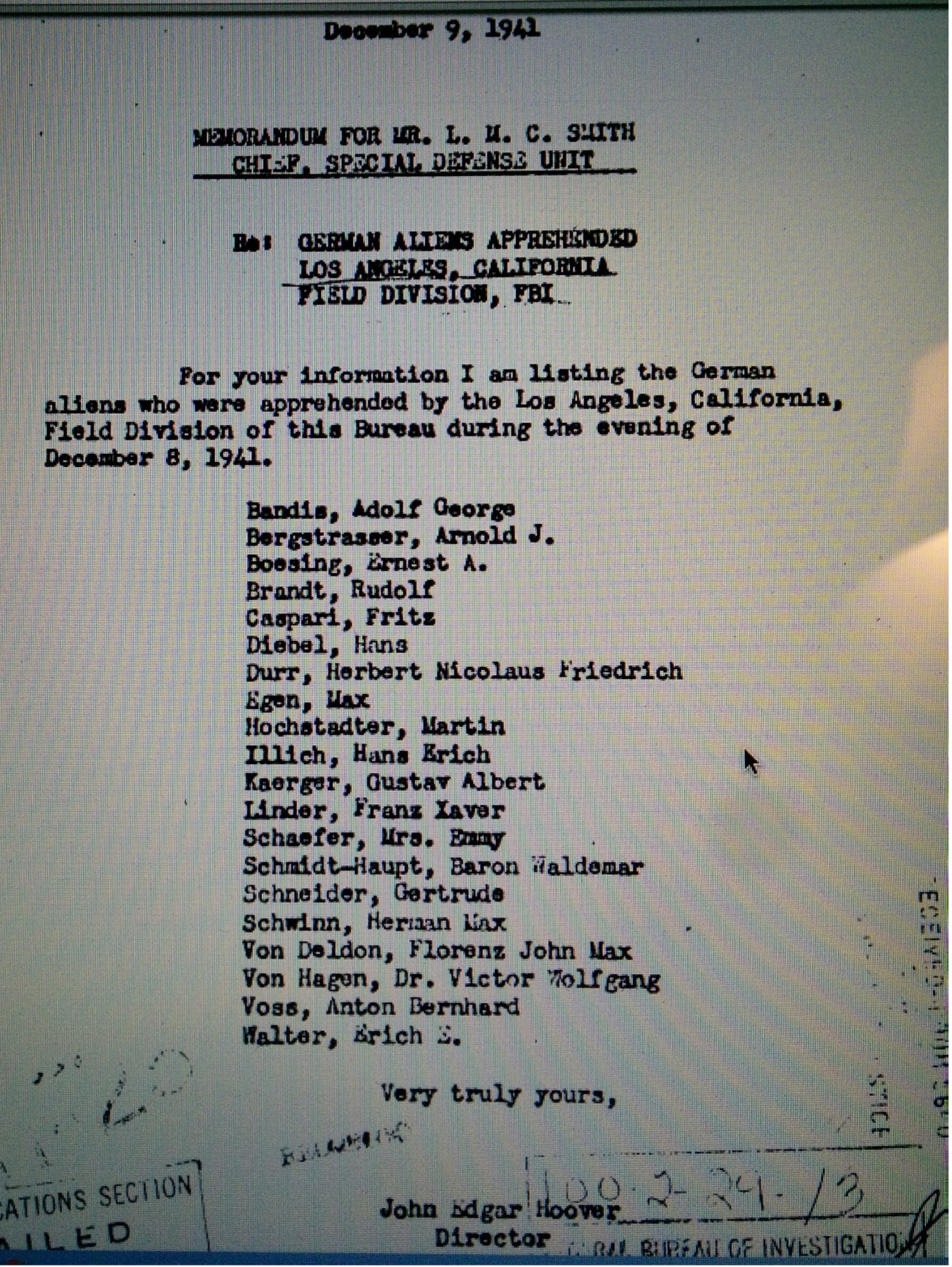
German aliens arrest list sent by J Edgar Hoover, FBI Director to FBI Los Angeles, 9 December 1941
The picture from a Los Angeles newspaper below which I found in my father’s folder shows those arrested coming off a bus and heading into detention. Fritz is in the centre of the group right next to the avowedly Nazi supporting deputy leader of the German-American Bund, the largest such organisation of those of German origin in the US.

Photo of FC (at centre left arm raised) and others being arrested, Los Angeles 8 December 1941
All those on the FBI lists in the Los Angeles area were initially taken to a former Federal Penitentiary located near the Port of Los Angeles on Terminal Island. Then on December 13, 1941 Fritz was transferred to the adjacent Immigration and Naturalization Service (INS) San Pedro detention station. He was weighed in at 136.5 lbs at a height of 5 foot 11 and a quarter inch and had US$2.62 in his wallet. Rather slim I thought.
The file also contained a note and saying sent to him by a colleague encouraging him to stay strong.
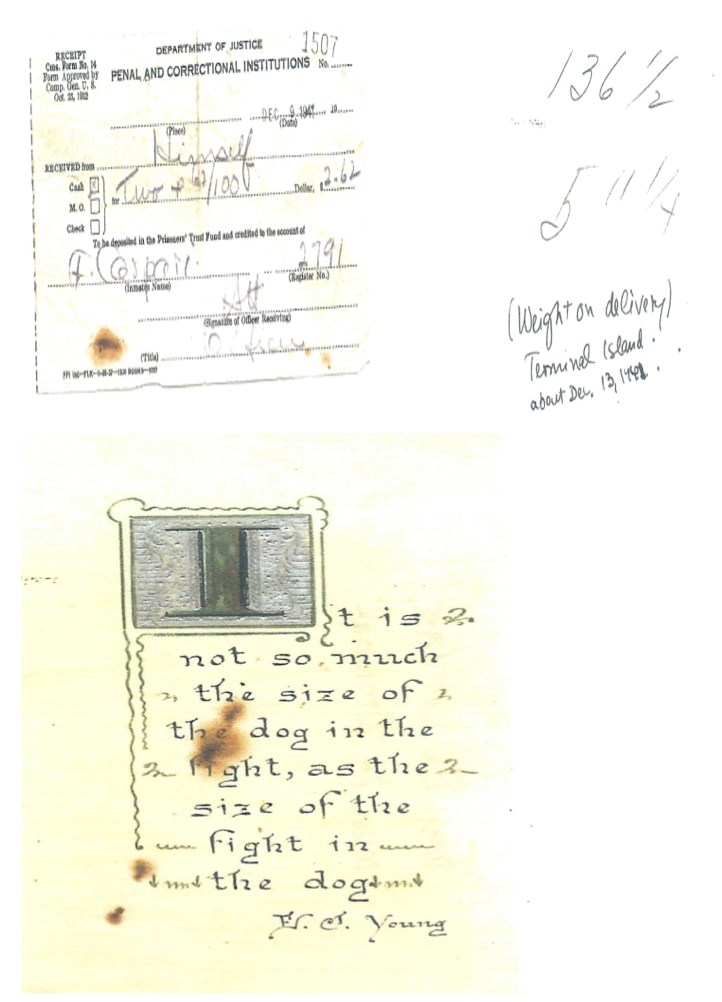
FC memorabilia from Terminal Island, December 1941
I reflected on how terrible and discouraging it must have felt to have been arrested at the same time as all the Nazi supporting Germans whose cause he so detested, and in a manner so reminiscent of their behaviour in Germany itself. Almost certainly without a warrant and late in the evening.
Interestingly war had been declared against Japan, but no declaration of war had been issued against Germany, so the arrest was based on a proclamation of that same day by President Roosevelt stating that a threat of war against the United States by Germany existed.3> This proclamation, and identical ones relating to the Japanese and Italians in the US, were in turn based on an obscure piece of legislation first enacted in 1798 (and re-codified in 1918) to allow citizens of countries deemed hostile to the US to be interned. This was the so-called Alien Enemies Act first adopted under US President Adams in 1798. It is still on the statute book although at the time of writing US Congressional Representative Omar has introduced a new bill to repeal this legislation called ‘The Neighbours Not Enemies Act 2021’.
In the weeks that followed, Fritz, with the help of a very capable and experienced attorney named Irving M. Walker (later to be my grandfather) in Los Angeles, started to gather fresh testimonials and affidavits to prepare for an eventual hearing and also later that month to prevent Fritz’s removal to Bismarck, North Dakota, reputedly the coldest place in the US outside Alaska, where the pro-Nazi bigwigs who had been arrested with him were being sent. The folder I found contained the luggage label for this destination, so it was clearly a close-run thing.
Both the fact that Fritz escaped being sent to North Dakota and that after two weeks or so of internment a hearing date was fixed for late January 1942 were probably due to the many very supportive letters and affidavits provided for Fritz from colleagues at Scripps, fellow US Rhodes scholars, a chaplain, other academics and the Rhodes Trust and a young woman who had stayed with my father’s family in Heidelberg for some time in about 1936. She was a close friend of a cousin of the US Attorney General Francis Biddle and was thus able to get Biddle to take a personal interest in the case.
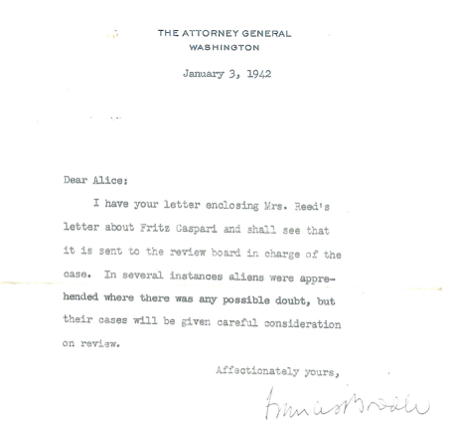
Letter about FC case from Francis Biddle, US Attorney General, Washington D.C. , January 3 1942
The hearing eventually took place in front of a tribunal which allowed no legal representation for those brought before it, it appears no witnesses were heard and seems to have largely relied on written ‘evidence’ from FBI agents and their (unknown) informants. Charges were not provided in advance, there were no judges on these civilian boards, and essentially if you even got to a hearing you were guilty unless you could prove otherwise. Thus in the space of a month under emergency legislation adopted for what eventually turned out to be spurious ‘national security’ reasons the usual safeguards applied to both citizens’ and non-citizens’ rights were abrogated.
In Fritz’s case, judging from the handwritten note he presumably made at the hearing when the scattergun of various charges was presented to him, the ‘evidence’ ranged from the fact that he had made a visit to Mexico; to the fact that he had maps in his car; that he had stated he had left Germany because he could do ‘more good’ for his country outside Germany than within it (where he would have been forced to fight for the Nazi regime); that he had been ‘seen’ near an air base; that he had visited the German Consulate at the request of the Consul to hear the German authorities’ request that he return to Germany, which he refused; that he had been heard making ‘propaganda speeches’ in favour of the regime etc..
Most of these charges were not worthy of the term ‘evidence’ or were based on unsubstantiated hearsay and could relatively easily be refuted especially given the very substantial dossier of favourable material the hearing was given.

List Fritz made of charges against him at tribunal hearing 23 January, 1942
One charge, however, was more difficult and although it was apparently not much raised at this first hearing it was to come up repeatedly in Fritz’s dealings with the US authorities over the next eighteen months.
There is almost no evidence in the files as to what would have justified the highly dangerous classification Fritz had been given. It therefore took me a long time thinking through what my father had told me and working through the documents in the FBI file to grasp why Fritz had been given this status.
On his last trip to return to the US from Germany, Fritz had travelled on the Vulcania, a passenger ship sailing from Genoa in Italy to New York. As he was walking along the quay in Genoa waiting to leave on 19 September 1939, he had bumped into a fellow German Rhodes scholar called Adam von Trott. They had not been in Oxford at exactly the same time, and they would have had somewhat differing political views as von Trott was more conservative, but they had I believe known each other since Fritz had visited Oxford during a trip to England in 1932. Now von Trott was working indirectly on behalf of the German Foreign Service. As far as the Nazi German authorities were concerned, one of the main purposes of von Trott’s trip to the US was to ensure that America remained neutral in the war which had just started in Europe.
In reality, however, von Trott was on a far more dangerous but ultimately unsuccessful private mission. He was part of a group resisting the Nazi regime internally and planning to remove Hitler from power. Some years later he was to be hanged for his role in seeking to assassinate Hitler. On this trip, contrary to what his employers believed him to be doing, he was trying to meet senior officials, including President Roosevelt himself, to brief them about the German opposition to Hitler and gain assurances that Germany would not be subjected to the same onerous territorial and other conditions as after the First World War if he and his fellow conspirators managed to succeed in their plans to remove the regime, seize power and end the war.
When the boat arrived in New York in late September 1939, Fritz and Adam started on their own separate disembarkation processes. They agreed to meet later that day at von Trott’s hotel. In contrast to Fritz, von Trott was, however, travelling First Class and cleared through immigration much faster than Fritz who arrived at the hotel only after von Trott had already left it for another meeting. Fritz left a handwritten message at the hotel for him in German saying he was sorry he had missed him and explaining that ‘the control lasted long’, referring to immigration control. The FBI, already distrustful of von Trott, picked up the message and saw it as suspicious, believing it to refer to radio code. From then on Fritz was to be monitored regularly by the FBI as he was considered to be working with a highly dangerous enemy agent.
The FBI’s doubts about these two men would have been reinforced when von Trott, who was constantly tailed by the FBI during his US stay, visited Fritz in California before he travelled onwards to Japan in January 1940. During this stay the two young men decided to have a laugh by pulling into a side road in their car and watching as the FBI agents whizzed past and then after a few minutes were seen to drive back down the road slowly. Perhaps this prank was also one of the reasons why seventy or so years later I discovered Fritz had carefully cut out the 3-4 pages of his diary relating to von Trott’s visit to him at this time although I imagine my father’s diary was addressing their discussions on weightier issues such as the future of Germany
With the help of numerous new testimonials Fritz was ultimately able to persuade the hearing that the evidence against him could not be substantiated. The tribunal ruled that Fritz and his older colleague should be released on parole. The following month Attorney General Biddle further eased the conditions of their release by deciding it should be unconditional, so in March 1941 both men were allowed to continue their teaching from outside detention (Fritz at least had continued to prepare courses and mark papers from inside the detention station).
Fritz and Arnold were warmly welcomed back but their undoubted relief at being freed was not to last. It was not universally welcomed. Letters denouncing the pair were soon being sent to the authorities and in April the American Legion, a self-styled nationalist group, published an open letter to the parents of Scripps College students requesting that these write to the College to demand that Fritz and Arnold be removed from their posts. The American Legion took the view that even though they had been deemed to be no threat by the tribunal, the American Legion still had reservations which they expressed as follows:
‘it seems to us most dangerous that such ‘enemy aliens’ trained in the Nazi school of thought, should now be entrusted with the education of our young people’. More truly than ever, all loyal Americans must stand together in our common cause. ‘Those who are not for us are against us.’
Interestingly the file I found in the basement in Portugal also contained an extract from a book which Fritz had taken a copy of. This was written in 1927 by Norman Hapgood, Sidney Howard, and John Hearley. Norman Hapgood was a writer, editor and sometime diplomat and one of his main claims to fame was exposing Henry Ford’s rabid anti-semitism. Hapgood notes that in the 1920s the National Commander of the American Legion had sought to invite Mussolini to the US as they clearly rather admired him.
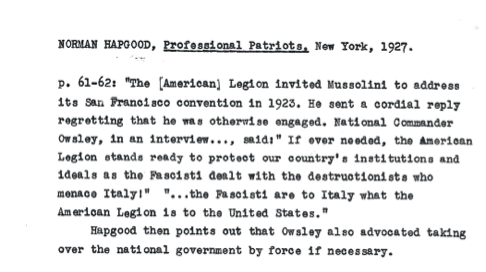
Extract from Norman Hapgood et al. book ‘Professional Patriots’ kept by FC
Hapgood goes on to note that these ‘professional patriots’, as the title of the book goes, had also ‘advocated taking over the national government by force if necessary’. The ultra-nationalist American Legion were clearly direct predecessors of those anti-democratic forces still prevalent in the US and elsewhere today.
Going back to 1942, however, apart from encouraging Fritz and Arnold’s dismissal, these heroes must also have decided to take direct action and tried to warn off people more directly from visiting Fritz or the Bergstraessers by carving swastika emblems into the oranges hanging on the trees outside their campus offices. My mother Elita, then working for the US war effort inspecting rivets at the Douglas aircraft factory, was clearly shocked and outraged by this action but was not deterred from continuing to see Fritz. She, like Fritz and Arnold’s colleagues, was also much concerned for their safety and welfare and on at least one occasion, when they feared a direct attack, fellow Scripps faculty members provided temporary shelter.
In an interview just before he died Fritz told this story:
‘One evening after my first release I was in the flat of a senior colleague and friend. He had invited me. I was under curfew as all aliens were to not move around after 8pm. Some other colleagues came to join us. There were five or six of us sitting around. I didn’t know why they had come. We conversed for about two hours, then suddenly a student, who was later killed in the Pacific, came to the house.
“It’s alright” he said.
I asked, “What’s alright?”
It transpired that the American Legion, a patriotic organisation, had decided to take things into their own hands. Worried by the release of aliens from internment and still believing them to be dangerous enemies, they had held a meeting and were debating whether to burn down the house I was in and kill us. The student had listened to the debate. In the end a small majority turned out to be against firing the house. He had slipped away and came and told us….There were also to be guns at the ready if we left the house when it was fired. It was a dangerous situation in either case. But I survived it all. A strange business.’
In spite of strong support from almost the entire faculty, parents and the student body who passed resolutions in support of Fritz and Arnold, it was all to no avail. In late June 1941, despite some weak public protestations of support he had made which were reported in the Los Angeles press cuttings I found in my father’s folder, the President of the College Professor Ernest J. Jacqua betrayed them by writing a secret and private letter on non-College headed Harvard Club paper to the FBI’s New York bureau while on a private trip to New York. The letter asserted that the two men were not to be trusted and should be re-investigated by the FBI. He also ensured that despite their strong teaching records and contrary to what had previously been agreed their contracts were not renewed for the forthcoming academic year. His reasons for behaving so hypocritically are unknown but I can only presume that in his heart he simply went along with the general line that there could only be Nazi supporting Germans. Soon after this action he left the College.
Largely because of this letter both men were re-arrested, again without a warrant, on 11 September 1942. This time they were taken to Tuna Canyon Detention Station, a former Civilian Conservation Corps camp converted to a detention facility with a number of black wood-cladded long rectangular barracks surrounded by oak trees and high barbed wire fences and watchtowers located east of Los Angeles. This time they were interned with several hundred other male internees of mainly Japanese, Italian and German origin.
The camp did, however, also hold other unfortunates caught in the web of suspicion and hysteria surrounding these nationalities and those of other belligerent nations. Thus, it also contained Romanian merchant seamen whose boat had the misfortune of being docked in Los Angeles Harbour when war broke out and even more sinisterly, Japanese citizens who had been arrested in South America at the US Government’s behest and, then as modern parlance would have it, ‘rendered’ to the US. For many, Tujunga, as it was also known, was to be a holding facility before they were shipped to other camps located closer to the centre of the country for the duration of the war. In the case of the Japanese, it is estimated that some 120,000 men and later their families were held in this way in camps scattered across the western and central US, from nearby Arizona to Arkansas in the American South.
This detention created many injustices and inconguities. One of the oddities of the camp Fritz told us about was that when he got there many of his fellow internees were ageing Italians given to playing boccia. They had, according to Fritz’s recollection, apparently arrived in the US in the 1880s before immigration controls were introduced and had never bothered to take out US citizenship. They seem to have been regularly visited by their American sons in US army uniforms.
As to the Japanese, many of whom were fishermen and farmers and who like the Chinese had, for essentially racist reasons, not been allowed to take US citizenship since the 1870s, many of course also had US born citizen children who would come and visit their fathers during the allotted visiting hours. These US born children at least spoke English unlike many of their parents who mainly spoke Japanese but were not allowed to communicate in this language for ‘security’ reasons.
Ultimately not a single person interned in this way was ever successfully prosecuted by the US authorities for any act detrimental to US interests. In 1943, US Attorney General Biddle ruled that the classifications the FBI had used were wholly unreliable and declared them null and void. In 1989 the US Congress passed legislation compensating the Japanese survivors and their families for the injustices they suffered during this period.
But back to the camp. Shortly before Fritz arrived there, the Red Cross had ruled that the conditions did not comply with the requirements of the Geneva Convention regarding the treatment of interned alien enemies. Fritz related that this was almost certainly due to rampant corruption in the procurement and provision of food for the prisoners which was apparently virtually inedible. The rotten meat was being disguised by curry powder. Those responsible for food supply to the camp were ‘skimming’ the funds.
At some stage shortly after he arrived, the camp management instituted an ‘election’ for a committee to represent the detainees and Fritz was, I believe, chosen in this way to represent them with the management of the camp4. Soon after this the camp commander, a Mr. Merrill Scott, called Fritz into his office. Fritz recalled him as saying:
‘You are a professor. You will be able to do this. The Japanese have said they will kill all the Germans, but they have given me their assurance they won’t kill you.’
Fritz took on the task and ended up being responsible for feeding three hundred people. He seems to have gained the various nationalities’ trust especially after he appointed separate cooks for each nationality, and managing to keep the peace by procuring the staples of rice for the Japanese, potatoes for the Germans, and pasta for the Italians. In any case, as he related later in life:
‘There was a supply chamber – my iron rations for the camp – and I stopped the Japanese from taking all the tuna. They had been the fishermen doing the tuna fishing, which was then tinned, so no more was being caught. I tried to please all the nationalities and I managed to keep them alive pretty well.’
I imagine maybe this also provided some excellent training for his future work as a diplomat.
While at the camp he was also engaged in writing letters for other detainees, teaching English and seems to have tried to help organise events for the internees as the telegram below from the violinist Yehudi Menuhin, whose sister and parents Fritz knew, indicates.
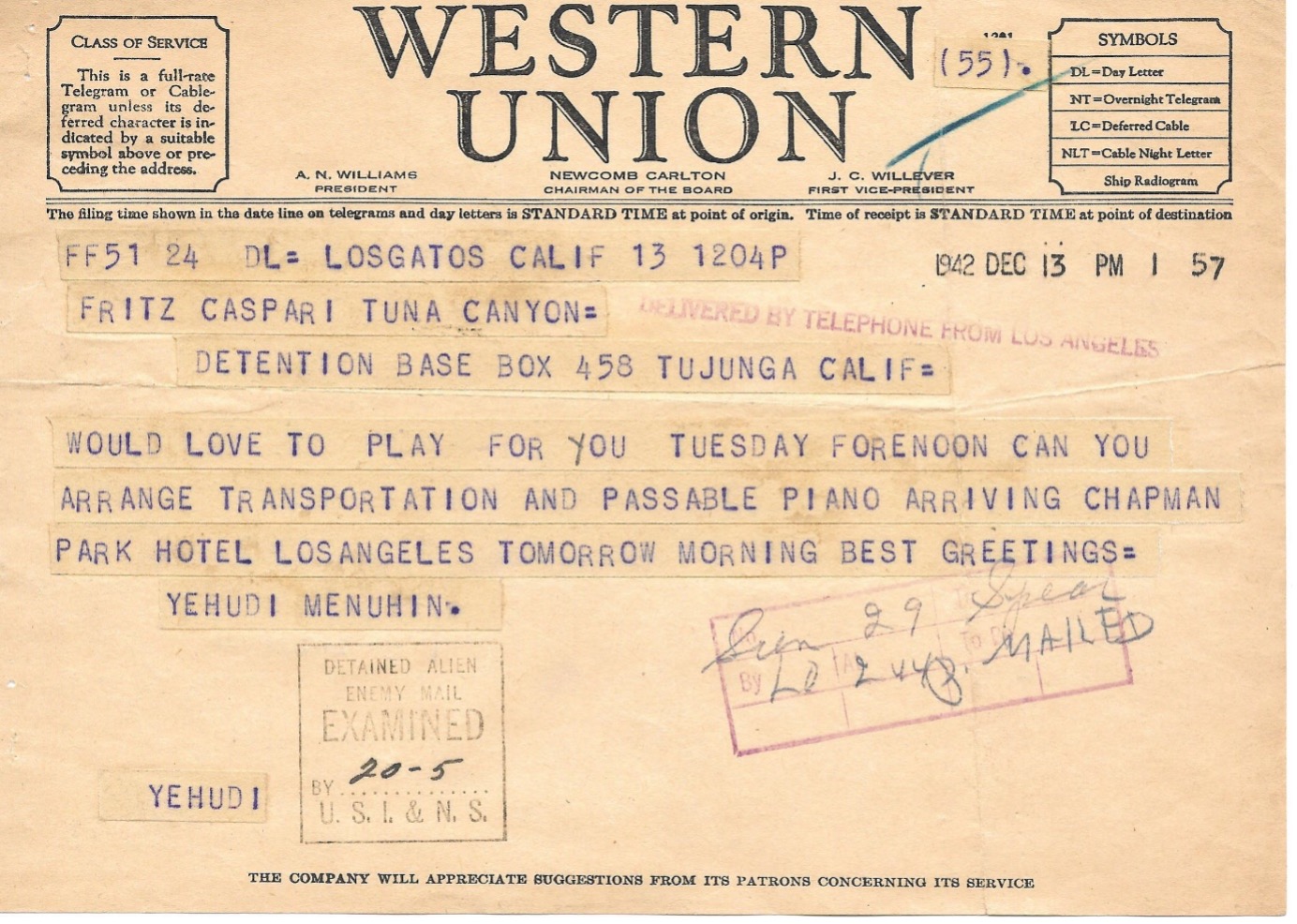
Telegram from Yehudi Menuhin to Fritz Caspari, Tuna Canyon, December 13 1942
It is unknown whether the concert ever took place but a picture I discovered a few months ago suggests that Fritz’s relationship with the Japanese had grown strong by the time New Year 1943 arrived. Fritz is the only person with blonde hair.

Group photo with signatures Tuna Canyon New Year’s Day 1 January 1943 (taken by K.T. Tsuchiya, San Francisco)
While at the camp and afterwards, the only communication with his family continued to be via short Red Cross messages which sometimes took months to arrive. These were regularly opened by the censors and on occasion Fritz had to explain their content. It was by this means he learnt of the deaths of both his adopted cousin who had been brought up as his brother from an early age and his youngest brother. They had been fighting in Russia and Finland respectively.
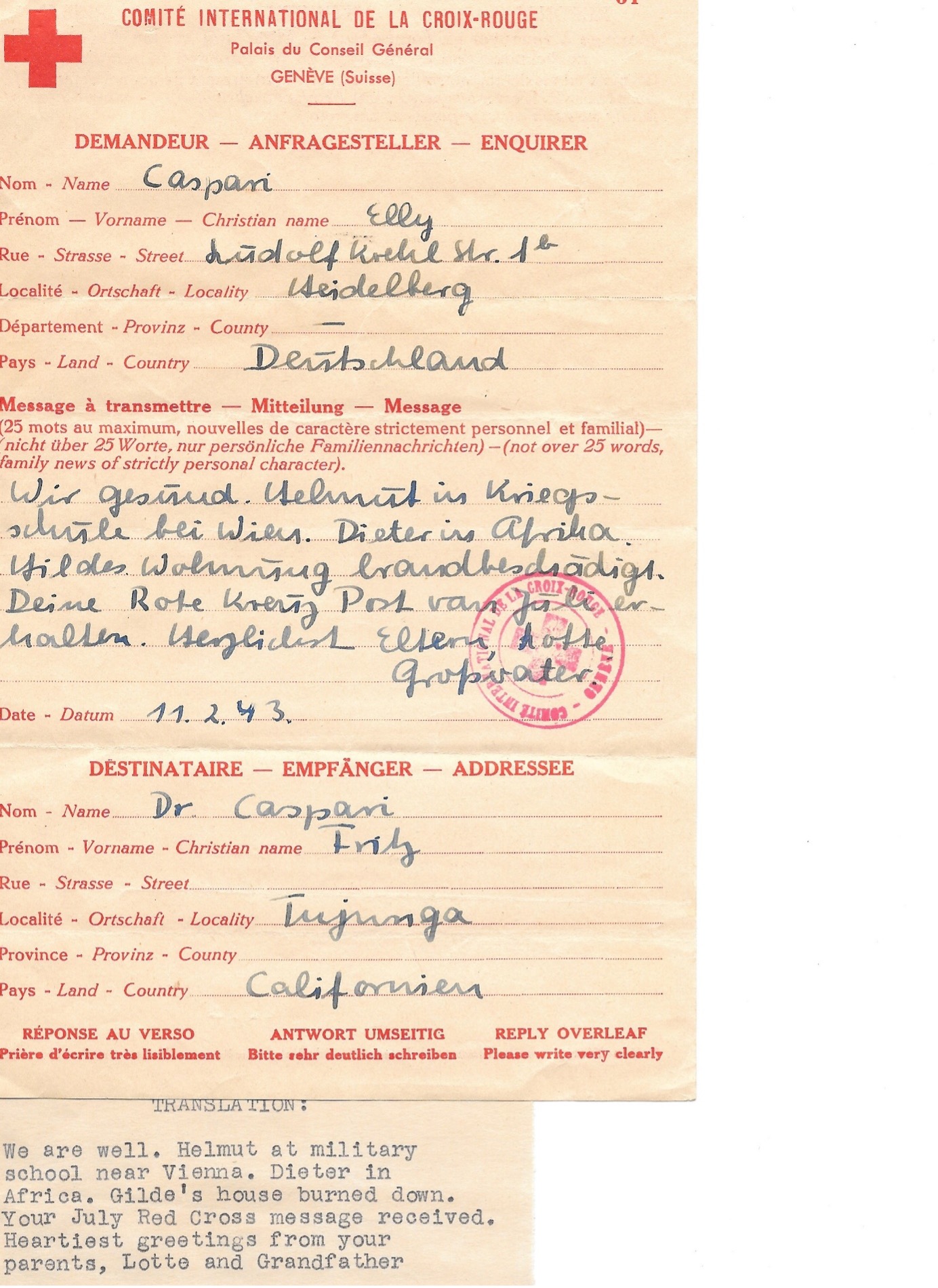
Red Cross message to FC at Tuna Canyon Detention Station from his mother Elli, 11 February 1943
Despite the vicissitudes of life in the camp, the management seems to have been exceptionally humane. After he left, Fritz wrote to Merrill Scott, the Camp Commander, praising his handling of the often-delicate situations which prevailed, saying the camp was a model of ‘democracy in action’ and he hoped ‘the world after the war could be permeated with such a spirit’. He also noted that apart from catering (something he decidedly did not carry into his later life), he had learnt a good many practical skills: cutting wood, digging ditches, mixing cement, scrubbing barracks and so on. As far as I am aware Fritz remained an intensely impractical man despite this experience. One letter written to him by a fellow inmate also records decades later that my father regularly did morning gymnastics. He was apparently also frequently being visited by Elita who appeared, the writer recalls, with perhaps some jealousy, as if she had just stepped off the front page of a women’s magazine. An image of the ideal American ‘college girl’!
Ultimately Fritz was lucky compared to the many thousands who remained in detention. After this further stint of four months he was set free on parole in January 1943 with Arnold Bergstraesser and German playwright and screenplay writer Karl Vollmoeller5. Unlike thousands, he had not lost everything such as a business or his property, nor was he detained without a hearing for years.
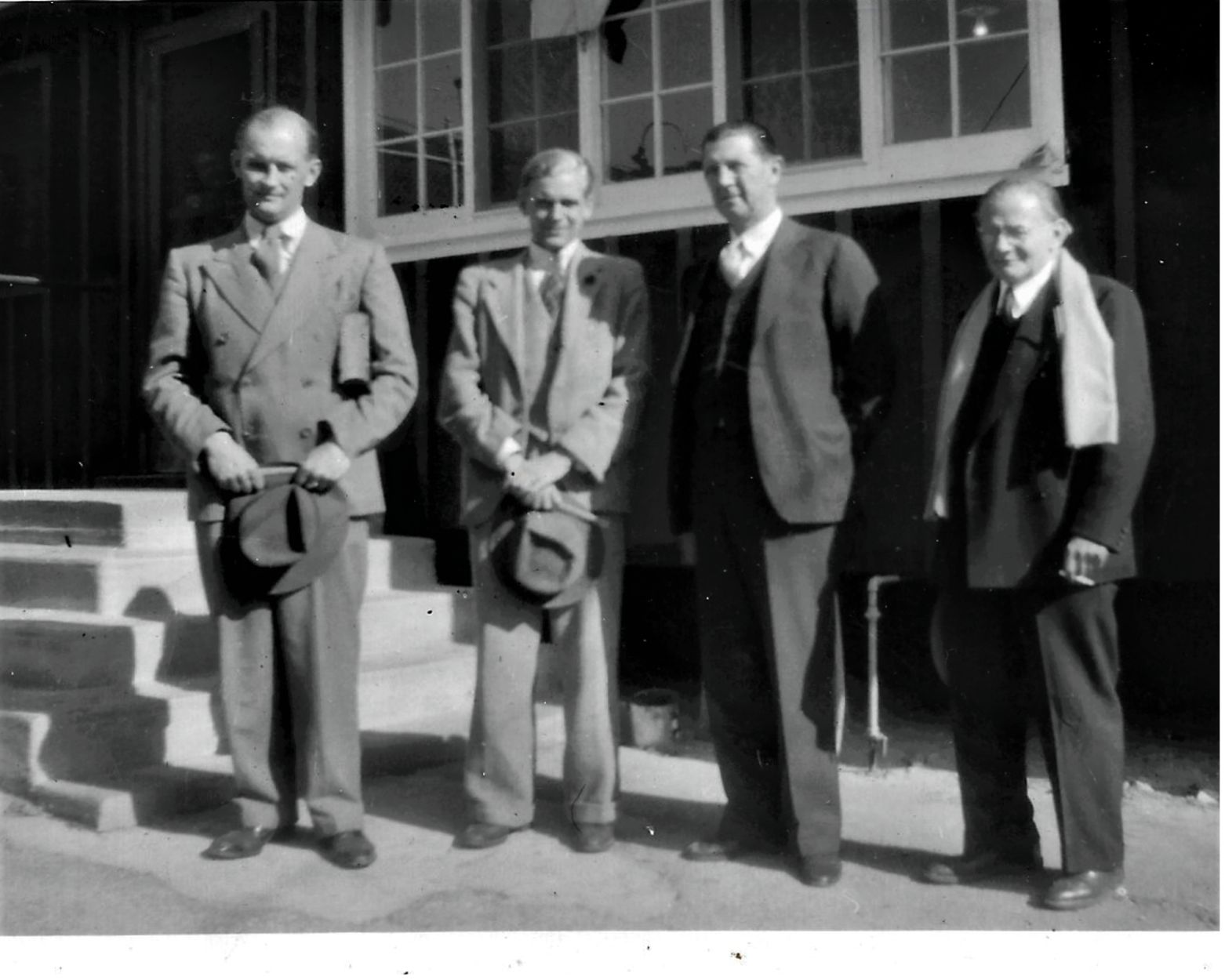
Photo taken on release from Tuna Canyon, 18 January 1943 with from left to right Arnold Bergstraesser, Fritz Caspari, Merrill Scott and Karl Vollmoeller
He did lose his job however. Yet, after a few months he took a new position as a librarian at the University of Chicago’s Newberry Library.
Most significantly he married Elita, my mother, in Los Angeles in 1944. A marriage that was to open a new chapter.

Fritz Caspari and Elita Walker wedding photo, Los Angeles, 9 February 1944
In his interview my father described the run-up and wedding itself as follows:
‘There were about 150 people at our wedding. The arrangements were complicated not by my nationality but because my religion was Protestant and my wife was Catholic as her mother was a Catholic due to her Spanish ancestry. She was part of a large Catholic community in Los Angeles.
It was the case then that being married by a Catholic priest the non-Catholic would have to promise to bring up the children as Catholics. I refused to make the promise in that form. The priest said if I would not promise this then he would block the whole family from coming to the wedding so I went to the local Archbishop who was also a Cardinal. Finally, I got him to sign/write a notice to the priest commanding him not to enforce the provisions. The priest was furious.
So a Catholic married a German Protestant – born in Switzerland and baptised in the Swiss Reform Church of Calvin and Zwingli, who then grew up in the Baden of Luther and Calvin.
It was strange – an argument between a paroled enemy alien and a Cardinal Archbishop. Even my mother-in-law was annoyed by the ignorant Irish priest. So eventually the family were allowed to come and I promised to bring the children up as Christians not as Catholics. This was an exceptional arrangement.
There was dancing at the reception, and then we left and I was given special permission to go in a car on honeymoon to Yosemite.’
Apart from the priest and my father’s resistance to Catholic doctrines I thought it was brave of my mother to marry an ‘alien enemy’ as well as for her family to wholeheartedly accept him. I always imagined that she secretly saw him as more of an Englishman than a German, given the formative years he had spent as a young student at Oxford, though she tried hard to adjust to what was soon to be an additional nationality. My brother Michael was their first child, born in 1945 just before the end of the war. I appeared seven years later, also in Chicago.
Soon after this Fritz and Elita moved to Germany. My father was keen to pursue his long-held ambition of working towards a new Germany. He had been asked, as a German with a non-Nazi past, to return and join the newly re-established Foreign Service. During the period that followed he played a major role in re-building relations with Britain and seeking reconciliation with several of the other countries Germany had fought.
The war and internment experience in the US meant Fritz had lived through a tumultuous decade in which he had to grow up fast. Yet despite the strains of this, he continued to maintain an idealistic, liberal and internationalist outlook. His positive vision rubbed off on Elita and the four children. The eldest Michael went to work for a period at the UN in New York and Tanzania. I tried to follow in his footsteps by also working for the UN but ultimately the main focus of my working life to date has been on food and agriculture related issues in the European Union. Elisabeth worked for years between South Asia and the US. Andrea, my youngest sister, completed her anthropology doctorate on the large Portuguese migrant community in France.
Even though Fritz had returned to Germany as part of the Foreign Office when he was forty, his long sojourn outside the country, especially in the UK, the US and later Portugal, meant that he did not settle full time in Germany when he retired. He in fact stayed abroad and was often in motion. He returned to Germany frequently to give lectures and talks and even had a flat there. Unlike my mother, he was not introspective, and apart from vivid stories of his Foreign Office life and repeated anecdotes, and despite a phenomenal memory, he hardly spoke about this earlier decade until he became very old. It was at this time that he allowed his mind to wander and to reflect on earlier periods of his life. His survival was combined with guilt at living a full life when so many did not. These scars always remained with him and came to haunt his dreams.
1. This paragraph draws on notes generously provided by Professor Russell Endo.
2. The 2 refers to the quality of evidence available.
3. Presidential Proclamation on Aliens No. 2526 – Alien Enemies—German. The United States declared war against Germany on December 10th, 1941.
4. Many years later a fellow German detainee wrote to Fritz that he had withdrawn his candidate for ‘mayor’ in favour of Fritz suggesting there was a semi-formal election process.
5. Karl Vollmoeller wrote the screenplay for the 1930 film ‘The Blue Angel’ which made a star of Marlene Dietrich
